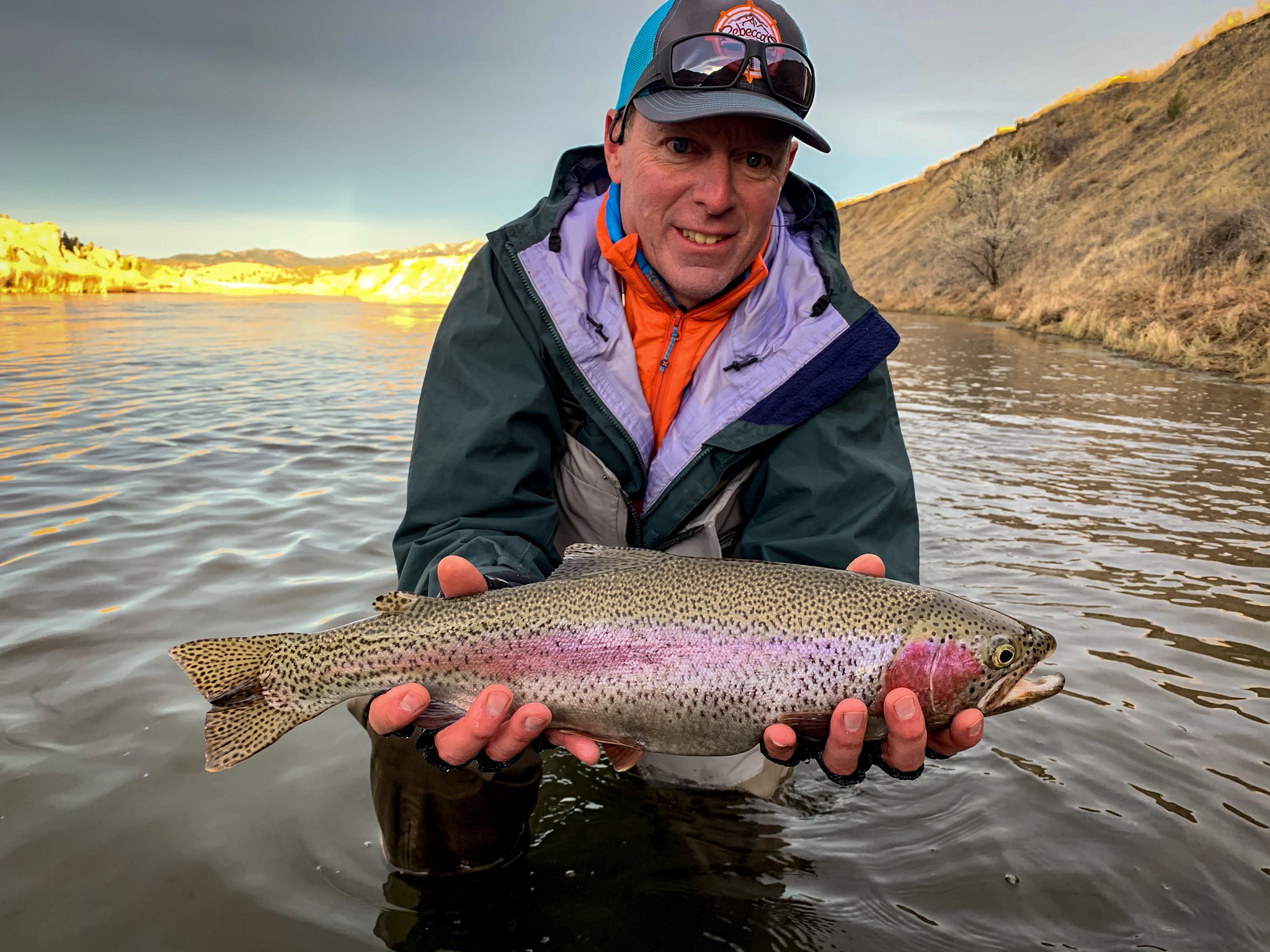[vc_row][vc_column][vc_column_text]I get asked all the following question all the time:
“When is the best time to swing flies with a two-hander on the Missouri River?”
And I always give the same answer:
“November and December”.
And here we are in November. And like the rest of the year, everything seems to be a little late. But over the last week we’ve seen spey fishing go from OK to pretty-damned-good. And it’s even been great, depending on where you are, when you are, and what you’re using. Last Saturday, annual spey customers James and Mike (pictured above and below) had an outstanding day using mostly floating techniques and small/light patterns. Lots of visible surface takes.
It takes November water temps (under 45 degrees), waning hatches (or none), and likely a lack of drifting weeds to get that swing brute going. Whatever the factors are, it never seems to get really good until November. So here we go.
WHERE?
I like to concentrate on medium to shallow flats with medium speed water. Look for knee to waist deep water, typically on the shallow side of the river or on/around mid-river bars and islands. Most of the fish have definitely moved out of the really fast stuff (but those big riffles are still a good spot to swing a flashy streamer). Deeper runs and buckets with strong definition (steep drop-off) are also very productive.
WHEN?
If you’re swinging flies and the weather is “November nice”, its hard not to recommend getting out there early. You could be swinging at 7:30am right now, and I would be if the temps (nighttime lows) are 25 degrees or more, and the wind lays down. Late morning through early afternoon seem to be the peak of the action, but you’ll likely have a flurry of activity right at dark if you’re in the right spot.
If it’s cold and blowing, Id probably wait a couple of hours. Remember, the days are pretty short and swinging runs takes up some time, so floaters should plan accordingly.
WHAT?
I almost exclusively use floating Scandi lines (Scientific Anglers Spey Lite Scandi) with intermediate sinking leaders. After adding 5 feet of tippet (commonly 2X), I attach a lightly or unweighted bugger or leech, and often trail a Sparrow or Carey Special behind it.
This same rig can be fished on a deeper Skagit sink-tip in big buckets. If I’m fishing heavy, fast runs or riffles, I may use the Skagit sink-tip rig with a larger flashier fly like the Montana Intruder, Stinger Sculpin or Home Invader.
YOU GOTTA GO TO KNOW
So get out there and give it a shot. Spey/swing fishing should only improve from here on out, and stay that way until it gets really cold for a long period of time (last year that was right before Christmas). We’re headed into a week and weekend with some great looking weather in the forecast with nighttime lows well above freezing for most of the week, and comfortable daytime highs.
GUIDED SPEY TRIPS
If you’re interested in a guided swing trip, now is an excellent time. I have time available, and we have a couple of other guides if you have a group that is interested. If the weather was crappy, I wouldn’t be soliciting trips, but I’d love to be out there later this week if the forecast stays true. And so should you! If you have any detailed questions about guided trips of spey questions, feel free to contact me at john@headhunterslfyshop.com or call me at 406-868-1951 (leave a message).
And yes, Headhunters is open every day if you want to stop by and pick up some intel, coffee, flies and shuttles.[/vc_column_text][us_image image=”37571″ onclick=”lightbox”][us_image image=”37572″ onclick=”lightbox”][/vc_column][/vc_row]
